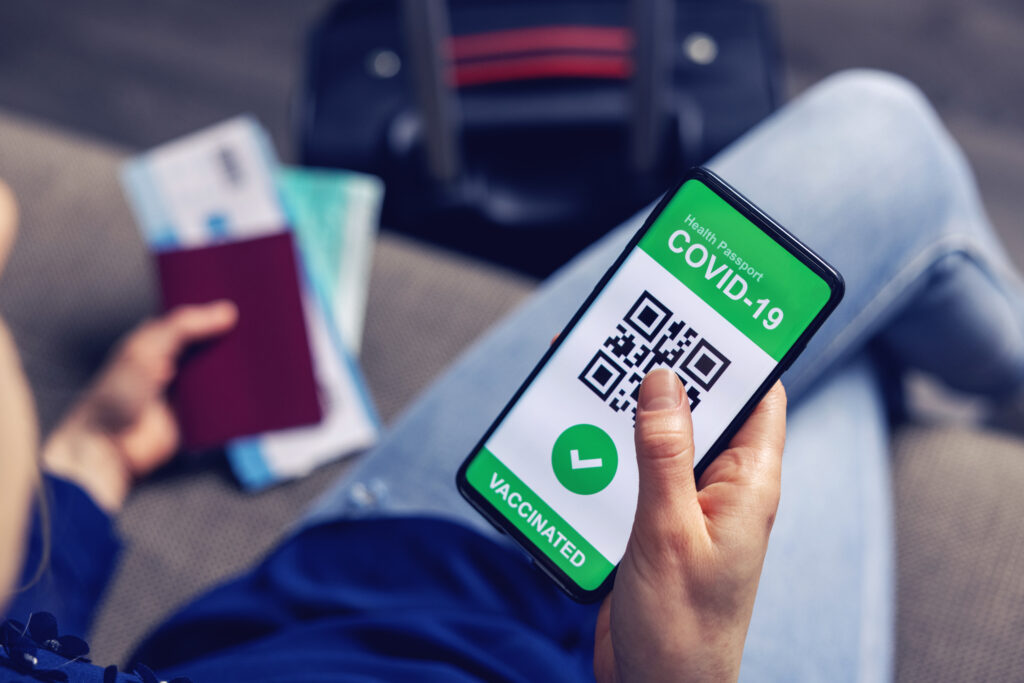Despite an uptick in holiday bookings in November and December 2020, IATA reports a worsening outlook for the aviation industry in 2021, with future bookings down 77% compared with the same period one year ago.1
This makes the regulatory approval and administration of multiple Covid-19 vaccines even more welcome and encouraging news for the industry. The vaccines may improve passenger confidence about the safety of travel, help protect frontline employees, and encourage both business and leisure travel. But a deeper assessment of the impact of the vaccines introduces critical questions about vaccination status, policy and cross-border governance for employees and passengers; aviation organizations should carefully consider and plan for these questions.
Data suggests that the Covid-19 vaccines may have benefits for passenger confidence. Following news of approval, 57% of 1,200 Americans surveyed are now optimistic (as of January 11, 2021) about safe travel in the next six months, according to Destination Analysts – up from only 46% in early December.2
But as the vaccines become more widespread, new questions are introduced. Will vaccination be required for domestic or international travel? How can passengers document or prove their vaccination status? Which organizations in the aviation journey – airlines, airports, immigration agencies – are responsible for monitoring and enforcing adherence?
There are also critical considerations for aviation employees. How are different countries and localities prioritizing vaccination for aviation employees? Who is responsible for monitoring employee vaccination status, and what are the impacts on employee work schedules? How should employee exceptions to vaccination be managed?
Airlines and airports can consider various steps for passengers and employees across policy, governance and vaccination management to meet these challenges and accelerate the benefits of the vaccine to their economic recovery. And although some steps may not be immediately implementable, those organizations that put plans in place now may be better positioned to take advantage of renewed travel optimism in the coming months.
Here are three steps that will help the aviation industry use the Covid-19 vaccines as a catalyst to help return trust to air travel, which in turn may help accelerate the industry’s recovery.
1. Develop tools for vaccination status management
Aviation organizations could implement a simple, digital, verifiable method for managing employee and passenger vaccination status. Passengers may have to document their vaccination status and use it across their journey. IATA has introduced its Travel Pass, a coalition of partners has introduced CommonPass, and Daon has developed VeriFLY – all important first steps.
Some airlines and industry players have pursued other digital tools for passengers to manage Covid-19 testing information for air travel. These tools would need to be readily available for vaccine documentation to create a process that is efficient for passengers. Airports and immigration authorities should also be prepared to manage multiple solutions for vaccination status simultaneously.
Employees may also require documentation and management of their own vaccination status, and aviation organizations need to identify where this information should reside. For example, international flight attendants may need to document their vaccination status to enter jurisdictions during layovers. Organizations need a plan for how to effectively document and manage this critical information.
Aviation organizations should begin to identify which digital tools may be appropriate for use now, and work on how implementation of those tools and associated processes fits into their overall recovery plans. Advanced planning and coordination are critical due to the industry’s complex stakeholder environment.

2. Create clear policies and governance for vaccination requirements
Differences in requirements for domestic and international travel across jurisdictions may create confusion for passengers. Aviation industry groups have been calling for standardization across borders in regard to Covid-19 policies and procedures, and IATA recently called for the European Commission to establish a standard Covid-19 vaccination certificate to facilitate travel throughout Europe.3
But in the absence of these standards, airlines, airports and civil aviation authorities should proactively consider establishing their own policies for travel with or without the vaccine. Will airlines require a vaccine for travel, as they have done with face coverings? Should government aviation organizations require proof of vaccine for domestic and international travel? Aviation organizations should establish clear policies from the start to create clarity and consistency for passengers.
The governance process may be even more important for employees. Should airlines require Covid-19 vaccination for staff? If so, what are the impacts on existing union contracts? How should exceptions be handled, such as employees who choose not to take the vaccine? These questions will inevitably arise, and employers need to have clearly established policies that are consistently enforced to drive adoption, adherence and confidence in vaccination at scale. The aviation operating environment of regional subsidiaries, contractors and vendors complicates this further and can create inconsistent application based not on what an employee does, but on who they technically are employed by.
3. Communicate proactively to continue to instill trust in the safety of travel
Education is still required to encourage vaccine adoption and adherence, and aviation organizations can play a leading role in this communication. A recent Kaiser Family Foundation poll indicates that almost one-third of those surveyed would not get the Covid-19 vaccine. And just over 55% of Americans expect to be vaccinated by June 2021. This reluctance can stifle the potential confidence boost the vaccine may provide for air travelers going forward, and the potential relief that the Covid-19 vaccine provides for aviation.
Proactive communications – for both employees and passengers – can encourage vaccine adoption while simultaneously instilling trust in the safety of air travel. A recent Deloitte study explored the impact of trust on human behavior, and found that trust is a critical element of the human experience that has been fractured as a result of the Covid-19 pandemic.
But when prioritized and directly addressed, elements of trust can have a clear benefit in employee and consumer confidence. For example, when employees believe that their organization cares about their experience and well-being, they are 2.6 times more likely to feel motivated at work.4 When consumers feel an organization consistently delivers on the promises it makes, they are twice as likely
to recommend that brand to a friend.
The Covid-19 vaccine is an important step in returning trust in the travel journey for both passengers and employees. These communication efforts do not have to be complex, and can even acknowledge when final information is not available but prep for vaccination is in progress. However, organizations can develop a dedicated communications approach to encourage vaccination among employees and promote adoption to demonstrate anticipated positive impacts on air travel.
References
2. https://www.destinationanalysts.com/insights-updates/
4. https://www.destinationanalysts.com/insights-updates/
This article was originally published in the April issue of Passenger Terminal World.

